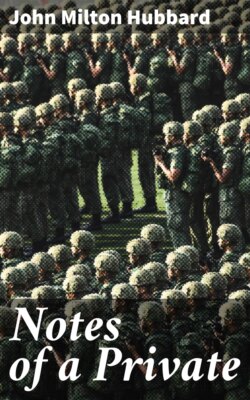Notes of a Private

Реклама. ООО «ЛитРес», ИНН: 7719571260.
Оглавление
John Milton Hubbard. Notes of a Private
Notes of a Private
Table of Contents
PREFACE. First Edition
PREFACE. Souvenir Edition
CHAPTER I. MUSTERING IN—“GOOD-BYE, SWEETHEARTS.”
CHAPTER II. SERVICE IN FIVE STATES. The Armstrong Raid
CHAPTER III. DAVIS’ BRIDGE AND CORINTH
CHAPTER IV. VAN DORN AT HOLLY SPRINGS
CHAPTER V. SOME PERSONALS AND PORTRAITURES
CHAPTER VI. ORGANIZATION OF “FORREST’S CAVALRY CORPS”—THE SOOY SMITH RAID—FORT PILLOW
CHAPTER VII. BRICE’S CROSS ROADS
CHAPTER VIII. HARRISBURG
CHAPTER IX. THE MEMPHIS RAID
CHAPTER X. INCIDENTS OF THE MIDDLE TENNESSEE RAID
CHAPTER XI. HOOD’S EXPEDITION—THE WILSON RAID TO SELMA
CHAPTER XII. CONCLUSION
APPENDIX. FORREST’S FAREWELL ADDRESS
A KINDLY REMEMBRANCE
Отрывок из книги
John Milton Hubbard
Published by Good Press, 2019
.....
The reader will remember that in closing the previous chapter I stated that Company E had been ordered to leave Missouri and take post at Columbus, Kentucky. The company was not then designated by letter, as it belonged to no regiment, but was known as the Hardeman Avengers. In company with our sturdy friends, the Haywood Rangers, afterwards Company D of the Seventh Tennessee Cavalry, we reached Columbus the first day of September, 1861, being about the first troops to occupy an advanced post among a people, who were then making a rather unsuccessful effort to play the role of neutrals. We were now in a “hog and hominy” country, and the soldiering was of the holiday kind. We made long marches through the Purchase and saw many evidences of Southern sympathy. Indeed, the whole population seemed to be friendly to us, as even those with Northern sympathies prudently kept quiet. Then, as now, I accorded people the right to think as they pleased, and to act upon their convictions. Throughout the contest, I zealously held to the principle that we should not make war upon old men, women and children. In the light of this principle, I was able to enjoy to the fullest extent a ridiculous attempt at concealment of real sentiment. For instance, somewhere in the Mayfield country, the column was one day passing a farm house upon the veranda of which was sitting a corpulent old gentleman, whose adipose matter hung sufficiently low to largely cover his femurs, as he sat with his pedal extremities slightly elevated on the rude baluster. While he wildly gesticulated he lustily shouted, “Hurrah for Jeff Davis and the Southern Confederacy!” At another part of the house a little girl was making strenuous efforts to haul down the stars and stripes, which doubtless was emblematic of the real sentiments of the household. The old fellow “got the horse laugh.” In our peregrinations through the several counties of the Purchase it seemed to me that we were riding much to little purpose, as the Federals ventured little beyond their lines at Paducah. I learned afterward that these exercises made us take on the ways of a soldier, and taught us valuable lessons in the bivouac. These stood us in good stead when, afterwards, we were forced to use to the best advantage very scanty resources.
In this month of September, 1861, it was learned that a force of Federals had occupied an advanced camp on Mayfield creek near Blandville. The five companies of Tennessee Cavalry having been organized into what was, for some months, known as Logwood’s Battalion, were ordered to attack this force. Here we were to hear bullets whistle for the first time. The command seemed to be eager to enjoy the sensation of battle. As a private, I was supposed to be in profound ignorance of the “plan of campaign,” but I could see enough to know that the maneuvering was for the purpose of surrounding the camp and forcing a surrender. Our company was drawn up in the woods within gunshot of the enemy, but we had no clear view of their actions. There was random firing on both sides, but there was no fixed purpose to press the fighting. Green as we were, we would have gone into that camp, had we been so ordered. There were men in that line, who afterwards, as officers and privates, became famous fighters and, in many cases, went to death on the firing line. Almost any one of Forrest’s real veterans would, at a later day, have considered it a light undertaking, with the backing of five hundred such men, to have “gobbled up the whole thing”—perhaps without the firing of a gun. And yet nobody seemed to be blamed for the failure of this expedition, for we were all ignorant of real war. We had had another lesson in that which would eventually make us veterans. We had heard the buzz of bullets.
.....